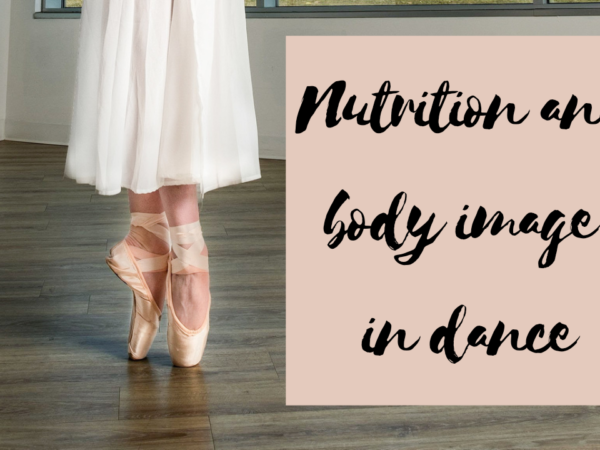Disclaimer: I am not a doctor or a nutritionist. I am currently working towards my master’s degree in nutrition, and this information is based on a research project I did for one of my classes. This information is not meant to provide any diagnosis or treatment advice. Please speak with your health professionals to address any health concerns you may have. This blog post is based on a research project I just completed for grad school. I am currently studying nutrition to become a Certified Nutrition Specialist.
Let’s clear the air about why dancers lose their period. Periods are not taboo, in fact, this is a topic we should be openly talking about. It is a part of educating dancers on the signs that our period gives us. You may be wondering why you lose your period while dancing, or if a period is really necessary as a dancer. Periods are inconvenient and often accompany not so fun symptoms, so let’s talk about why having a normal period is actually extremely important for dancer health.
First, what is amenorrhea?
To put out a few definitions, amenorrhea is the absence of menstruation in individuals of reproductive age. Amenorrhea can occur alongside other disorders like PCOS, but the type of amenorrhea we are talking about today is what is known as hypothalamic amenorrhea (HA) or functional hypothalamic amenorrhea (FHA). HA occurs solely due to the effects of prolonged psychological and physical stress. This could mean caloric restriction, over-exercising, unmanaged stress, or a combination of these factors (1). HA can occur in individuals who have not yet had their period, or in individuals who have had their period but who have not had their cycle for several consecutive months.
To put it simply, when our body is undergoing chronic stress, is not receiving enough energy, or is using too much energy, our body diverts its resources away from our reproductive system and towards the systems that keep our body alive (2). With this comes hormonal changes that can affect other aspects of our health.
How does this relate to dancers?
This is where we talk about specifically why dancers lose their period. Dancers and athletes are especially susceptible to HA because of the long hours of intense training, pressure to fit a certain size, and the sometimes high stress environment of dance companies and studies. Not every menstruating dancer will develop HA, but there is research showing that certain factors and personality traits that are often seen in individuals with HA. Attitudes of perfectionism, control, and rigidity as well as concerns over the thoughts of others make it harder for one to deal with stres (2,3). Stress from casting, rehearsing, and auditioning during pivotal years of a dancer’s training can influence a dancer’s ability to cope with stress and can negatively influence eating and exercise behaviors.
Dancers with HA have a higher likelihood of also dealing with disordered eating and disordered attitudes towards food and body image (1,4) This can lead to restrained eating behaviors and increased engagement in extracurricular exercise to achieve thinness. It is estimated that as many as 47% of female athletes with leaner body types have disordered eating, and the number of dancers could be even higher (4).
Why should dancers be concerned about their lack of period?
Estrogen is a hormone that has many functions, but it importantly influences our bone health and is vital to our reproductive health. The majority of estrogen is produced by our ovaries during our menstrual cycle. Estrogen helps our bodies to maintain bone mass and bone strength. There is a correlation between individuals with HA and low bone mineral density, stress fractures, and an inability to achieve peak bone mass (1,4). This is especially important for dancers, because it can influence a dancer’s injury rate, recovery period, as well as can lead to issues such as osteoporosis in the future. Prolonged amenorrhea has also been linked to an increased prevalence of psychological disorders like depression and anxiety, infertility issues, and cardiovascular issues (1,4). Amenorrhea should be taken very seriously by dancers, parents of dance students, teachers, and directors.
What should you do if you don’t have your period?
First, speak to your doctor, whether OB GYN or primary care doctor about amenorrhea. If you have a nutritionist or counselor that you are working with, they are also great to notify about what you are going through. Resolving HA is often best done with a team of individuals who can help you address your nutrition needs, stressors, and other behavioral and lifestyle factors that may be contributing to HA. Medical professionals are usually well versed as to why dancers lose their period. a
Second, change your mindset surrounding what a dancer’s body should be. HA can occur when dancers feel pressured to take on behaviors that drastically change their body composition in a way that negatively impacts their body. This is something that I experienced as well! It took me years for me to see that my natural body is a dancer body because it allows me to have the energy and strength to undergo long hours of classes and rehearsals. There are definitely going to be more posts on how we can start to change our body image in ballet. But for now, check out this post!
Third, make sure you are eating enough for your needs as a dancer! I cannot stress this enough. Our bodies need fuel in order to do the things that dance requires us and it needs the fuel to make sure our body can function optimally. Chronic undereating can lead to amenorrhea as our body is trying to save as much energy as it can. This also means eating a wide variety of foods filled with proteins, carbohydrates, and fat. For dancers, it is important to eat every 3-4 hours to make sure you are intaking enough energy for what you are expending. If you want to learn more about fueling your body, look here.
Lastly, find ways that help you to handle stress. I am someone who is especially sensitive to stress, and so this one has probably been the hardest one for me to tackle. It is easy for my stress levels to get out of hand and the compounding effects can make me lose my period for a month or two. I have found it important to find ways that help me to better manage my stress. For me, going to therapy, taking baths, giving myself regular breaks from dance and work, and cutting back exercise when needed are all tools that I use regularly. What will help you cope with stress may look totally different, so explore as to what works best for you.
I hope this post gave you some more information about HA and why dancers lose their period. If you want more information, I am linking all of my sources down below, and always be sure to talk to your medical team about what is best for you!
References
- Gordon, C. M., Ackerman, K. E., Berga, S. L., Kaplan, J. R., Mastorakos, G., Misra, M., Murad, M. H., Santoro, N. F., & Warren, M. P. (2017). Functional hypothalamic amenorrhea: an endocrine society clinical practice guideline. The Journal of Clinical Endocrinology & Metabolism, 102(5), 1413-1439. https://doi.org/10.1210/jc.2017-00131
- Roberts, R. E., Farahani, L., Webber, L., & Jayasena, C. (2020). Current understanding of hypothalamic amenorrhoea. Therapeutic Advances in Endocrinology and Metabolism, 11, 1-12. https://doi.org/10.1177/2042018820945854
- Morrison, A. E., Fleming, S., & Levy M. J. (2020). A review of the pathophysiology of functional hypothalamic amenorrhoea in women subject to psychological stress, disordered eating, excessive exercise or a combination of these factors. Clinical Endocrinology. https://doi.org/10.1111/cen.14399
- Huhmann, K. (2020). Menses requires energy: A review of how disordered eating, excessive exercise, and high stress lead to menstrual irregularities. Clinical Therapeutics, 42(3), 401-407. https://doi.org/10.1016/j.clinthera.2020.01.016




